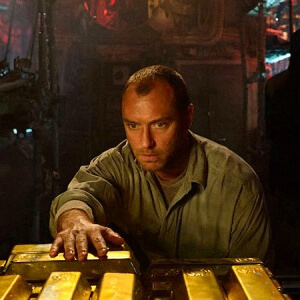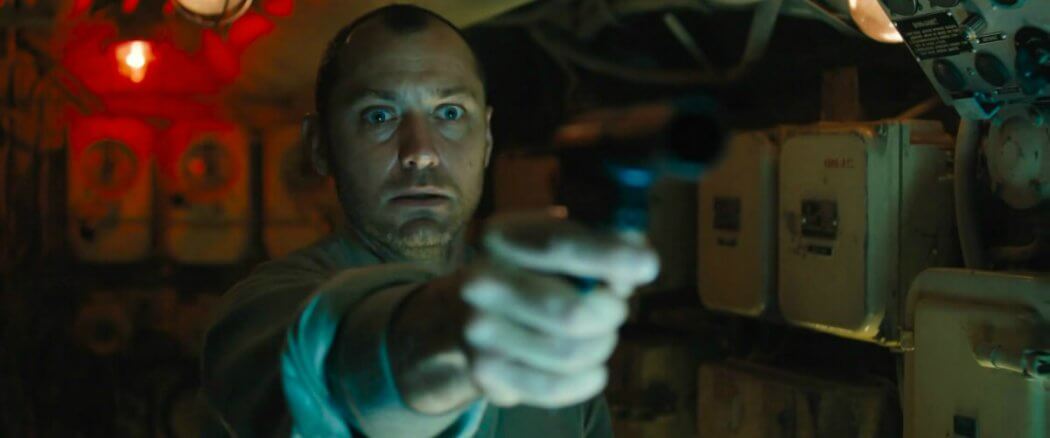“I’m claustrophobic,” declares a character early on in Black Sea. We grin because we know that phobia will be tested to the limits for both the character and us.
Claustrophobia is the main draw of submarine movies. Few things send shivers down the spine faster than the thought of floating through blackness in a tin can. There’s always the moment when the captain stands on the deck, taking one last look at the surface. He gazes at the sky in wonder, but feels the call of duty below. He knows that once the hatch is sealed, there’s no turning back.
The captain in Black Sea is Robinson, played by Jude Law with a Scottish accent. Robinson has a perpetual chip on his shoulder; sick of being the grunt with the dirty work while the privileged float by unscathed. We meet him disgruntled, fired from his job of 13 years. When a co-worker consoles him with a plan to get rich quick, he jumps at the opportunity. Gathering a crew of mercenaries, he sets off in a rickety submarine. The prize: a Nazi U-Boat at the bottom of the ocean filled with gold.
“Equal shares,” is Robinson’s mantra from the start. The crew respects him. He’s a natural leader. But it doesn’t take long for the men to do the math. Fewer recipients mean greater shares. Suddenly, everyone is fair game, and there’s nowhere to hide.
Atmosphere
Director Kevin Macdonald understands atmosphere. The submarine becomes an oppressive backdrop. Dark corridors. The pings of sonar. Colored lights on sweating faces. The tension builds steadily, reaching a fever pitch in spots. The fear of the crew is tangible. As greed takes over, the men don’t know whether to be more afraid of the elements outside or within.
 Ironically, in a film that takes place at the bottom of the ocean, what Black Sea lacks is depth. Macdonald crafts a crisp, no nonsense style, which proves both a blessing and a curse. The movie gets to the point fast and stays there, but there’s little room for nuance. A slew of characters are presented, but most are only sketches.
Ironically, in a film that takes place at the bottom of the ocean, what Black Sea lacks is depth. Macdonald crafts a crisp, no nonsense style, which proves both a blessing and a curse. The movie gets to the point fast and stays there, but there’s little room for nuance. A slew of characters are presented, but most are only sketches.
Even Robinson is a dimension short. An attempt is made to connect him to his lost family, but the result feels contrived. Law is terrific as Robinson, infusing him with a steely-eyed intensity, but we never really know what makes him tick.
Still, for pure visceral thrills, Black Sea is hard to beat. This is a true cinema experience. The darkness of the screen combines with the darkness of the theater to make the feeling of dread palpable. Only later, after surfacing, did I wish there had been more meat on the bone.
The Have Nots
I was struck by a powerful visual image at one point of a man smoking a cigarette on a pile of gold as chaos swirls around him. The words of Jesus came to mind – “What does it profit a man to gain the whole world, but lose his soul?”
Robinson has valid complaints. As the divide between the rich and poor grows wider, the working class feels like hamsters trapped in a wheel. There’s a temptation to fight back and take what’s owed by any means necessary.
When Jesus burst on the scene 2,000 years ago, the Jews felt a similar oppression by the Romans. The Jews saw Jesus as their golden ticket to turn the tables and rule the world. But Jesus defeated Rome a different way, and, we too, must rail against injustice using a different set of tools. If we succumb to violence and force, we transform into the very system we’re fighting against. The oppressed become the oppressors.
As the body count rises in Black Sea and any hope of a happy ending drifts further away, we’re left with a disturbing question. What’s more frightening: the black sea or the hidden depths of a man’s heart?





